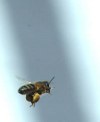 Bees making honey from honeydew rather than nectar produce a sweet material that has greater anti oxidant properties than nectar honey, according to a study of 36 honey samples from Spain with different floral origins. The study published this month in the Journal of the Science of Food and Agriculture could point to a way to improve the health benefits of this natural sweetener.
Bees making honey from honeydew rather than nectar produce a sweet material that has greater anti oxidant properties than nectar honey, according to a study of 36 honey samples from Spain with different floral origins. The study published this month in the Journal of the Science of Food and Agriculture could point to a way to improve the health benefits of this natural sweetener.
The composition of honey depends greatly on where honeybees collect their raw materials. There are two key sources. Honeybees can collect nectar from flowers, and this generates nectar honeys or they can collect fluids exuded by plants, honeydew.
‘Honey is a natural source of antioxidants, and among honeys, honeydew honey is the best,’ says researcher Rosa Ana Pérez, who works at the Instituto Madrileño de Investigación y Desarrollo Rural, Agrario y Alimentario, in Madrid, Spain.
Each of the 36 honeys was exposed to a range of physical and chemical tests. Honeys with high antioxidant properties also had high total polyphenol content, net absorbance, pH and electrical conductivity.
‘These laboratory results show some aspects that people could use to get an idea about which honeys are likely to have the most potent antioxidant properties,’ says Pérez.
Oxidation is a chemical process in which electrons are transferred from from one substance to an oxidizing agent. Antioxidants are basically compounds that slow the rate of oxidation and are as important the chemistry laboratory as they are in the human body. Antioxidants work either by reacting with intermediates and inhibiting the oxidation reaction directly, or themselves reacting with the oxidizing agent and acting as a molecular decoy to prevent the oxidation reaction from occurring.
All living things try to sustain a reducing (the opposite of oxidizing) environment within their cells to prevent damage by oxidation of their biomolecules. Compounds such as glutathione and ascorbic acid (vitamin C) as well as enzymes (peroxidases and oxidoreductases) act as antioxidants. If you do not have adequate levels of antioxidants in your body then oxidative stress and cell damage can occur. More controversial is the notion that supplementing with antioxidants a balanced diet of fruit and vegetables has any additional benefits, claims of anticancer effects and reduced risk of cardiovascular disease have yet to be proved. Indeed, excess of certain antioxidants can do more harm than good.